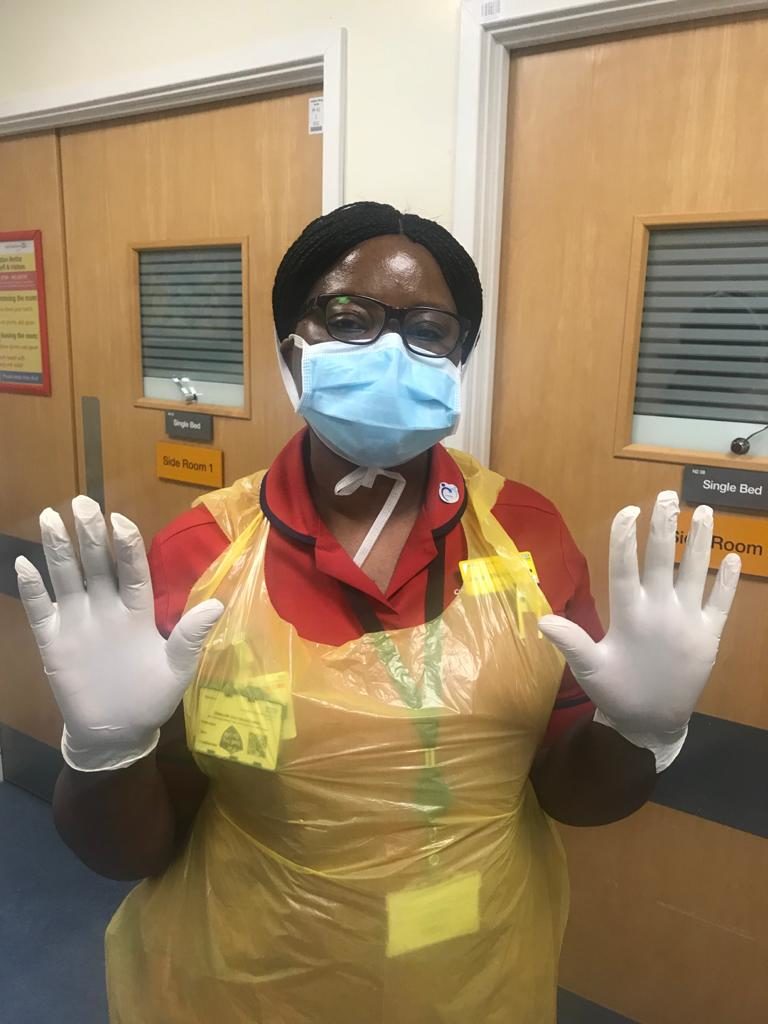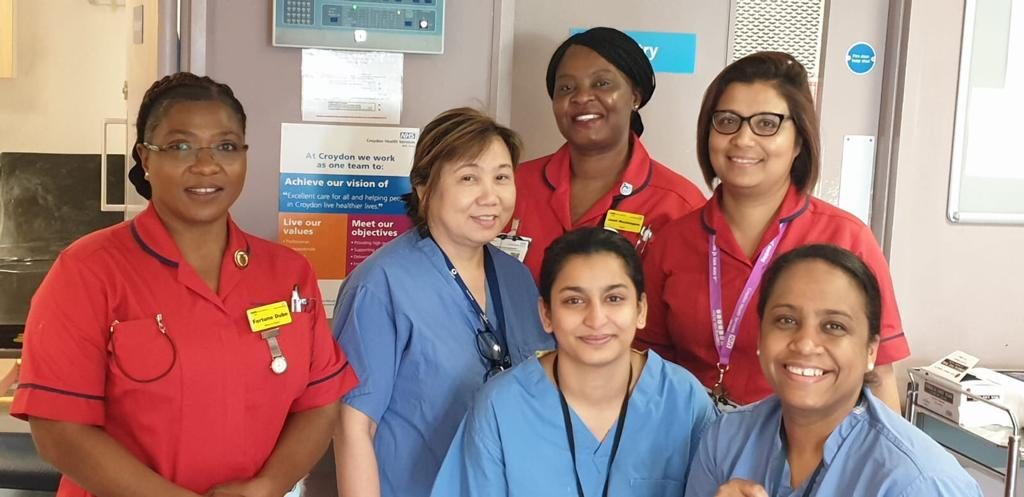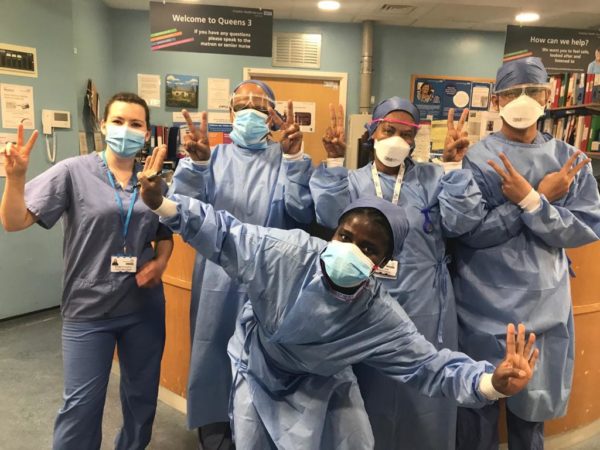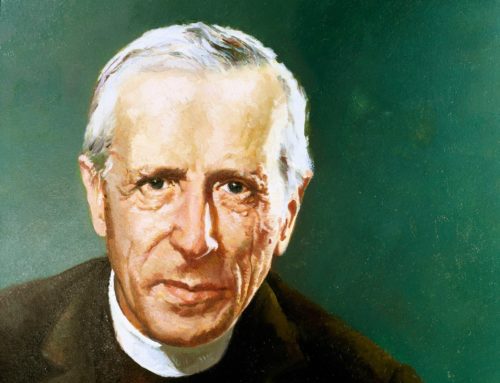My Experience with Covid-19
My dear brothers and sisters, I greet you in the name of our Lord Jesus Christ.
My name is Janet Muchengwa originally from Zambia and now settled in the United Kingdom. I am a professional nurse working as a Unit Matron in a hospital south of London. In addition, I am currently serving my second term of office as National President for the Association of Catholic Nurses in England and Wales and I am also Treasurer of CICIAMS.

I found myself among others in the frontline looking after Covid-19 patients and ended up being infected with Covid-19.
We started hearing of the Covid-19 and what was happening in Wuhan China with a further spread to Italy and Spain. With the fast spread of the Corona virus into other European countries, it became evident that our hospital was not in fact prepared for this unprecedented phenomenon. Our first Covid-19 patient was in Mid-March. Within a period of two weeks, the hospital was overwhelmed with the influx of Covid-19 patients’ admissions. There was an urgent need to create additional capacity for intensive care beds, which extended to theatre, recovery areas and cardiac care units. Covid-19 Wards were also created for suspected or Covid-19 positive patients not requiring admission in intensive care. The death rates were rising in Critical Care Units as well as in wards. Two of the Covid-19 wards were within the areas that I oversaw with one of the wards dedicated for patients who needed Non-Invasive Ventilation (NIV).
The major challenges at the beginning of the pandemic were the depletion of staff working on the frontline. This was either due to nurses becoming sick or taking care of their family members having contracted the Covid-19 virus. This resulted in staff requiring self-isolation for an average of 1-2 weeks; depending on their circumstances.
The management and distribution of Personal Protective Equipment (PPE) governed by the National guidelines and procedures were initially unclear, which caused uncertainty and confusion. This in turn brought a lot of anxieties amongst the frontline staff worried about their health or infecting their family members; especially those in the high-risk bracket of contracting Covid-19. The situation was further exacerbated with increase in the number of frontline staff and family members infected, with others subsequently dying of Covid-19.

In the second week of the pandemic response and management of Covid-19 patients, I became symptomatic displaying indicative corona virus related symptoms.
I was feeling lethargic, like one who had not slept for a couple of days. Then followed muscle and joint pains, likened to that of a malaria stricken patient; severe headaches with an unexplainable pain intensity which went on for days coupled with a dry relentless cough and nasal congestion. Luckily, I had no sore throat.
Eventually, my body temperature readings manifested 5 days later soaring into 38.4 degrees Celsius. From the onset of being symptomatic, I immediately self-isolated at home where I reside with my grown-up son, my sister and her two young children.
This home-based environment heightened by my stress and anxiety for fear of infecting the entire household, I emailed my workplace for swab testing and was swabbed 3 days later; as the service was not available over the weekend. I got my results 48hours later which calculates 5 days into me having the symptoms and the results came back inconclusive but Covid-19 was diagnosed based on my blood results and symptoms. Due to the persistent high temperature, the General Practitioner put me on oral antibiotics to treat secondary infection to which I responded very well but the lethargy continued for two weeks thereafter.
I was fortunate that my symptoms were not so severe to warrant a hospital admission and none of my family members in the household developed Covid-19 symptoms. However, the period in which I was under self-isolation meant that being absent from work for a period of 4 weeks. This was an agonising period as the guilt consumed me and left me feeling as having let my team down; considering that they were battling in the thickest of the pandemic and required every staff resource.
During this ordeal, I celebrated my birthday on the 11th April whilst nursing back to health. I had no expectations for that day as we were all in quarantine and still on the road to recovery. Thankfully, my sister and my son not forgetting my adorable niece and nephew surprised me with a birthday cake and sung for me. This may be something we often take for granted. This kind gesture meant the world to me. I also received birthday wishes from work colleagues and friends as well as connected with my family in Zambia via a video call. It was also a delightful moment speaking to my sister who shares the birth date with me.
I only have the greatest gratitude and blessing knowing that I had very supportive and caring people around me i.e. my young sister and my son during and after this difficulty time of my life. It was also very comforting seeing so many of my friends and colleagues praying for my recovery. Unfortunately, it was sad to see many front-line staff in critical condition and losing their lives in such great numbers. A sad reality was that most of these were of our ethnic minority.
I am now back at work finding a completely different atmosphere. There was an airiness around the wards, a silence never known before in the corridors and foyers of the hospital, wards were half empty and four 28 bedded wards remain closed. An unheard of surreal experience never seen before; witnessing patients dying in considerable numbers with some not having the opportunity to say good bye to their friends and family. This meant, in most cases the nurse was there to comfort the patient, updating relatives via telephone and hold the patient’s hand to recovery or to a dignified death. As a Catholic nurse, it was in moments like this that I reached out to provide spiritual nourishment to the patients. Our patients’ discharge moments led to the adoption of a tradition of applauding patients as they left the wards to return home.
Looking back at my experience, the pandemic has brought out some good learning outcomes. There is a great spirit of people caring for each other; the Ubuntu spirit as we would say back home in Zambia. The realisation of the importance of the frontline staff has slowly emerged with the recognition of the Thursday tradition clap as gratitude for hard working National Health Services (NHS) frontline staff nationally. The need for everyone to be tech savvy is much more urgent than ever considering that most communication during this period was done via emails, WhatsApp, Zoom and video conference calls. Of course, the way society engages is also changing with the emergence of social distancing and wearing masks being the ‘new normal’.
Finally, my brothers and sisters, I conclude with a grateful heart towards my strong and courageous nursing and medical team who continue to work tirelessly in response to the Covid-19 pandemic. We shall continue to soldier on in confidence to serve humanity and ultimately, overcome Covid-19 and ready to face future pandemics head on as we are better prepared.
I finish with words of encouragement from Pope Frances: “We have a Lord who is capable of crying with us, capable of walking with us in the most difficult moments of life”.
http://www.catholicnurses.org.uk/nationalexecutivecommittee.html







